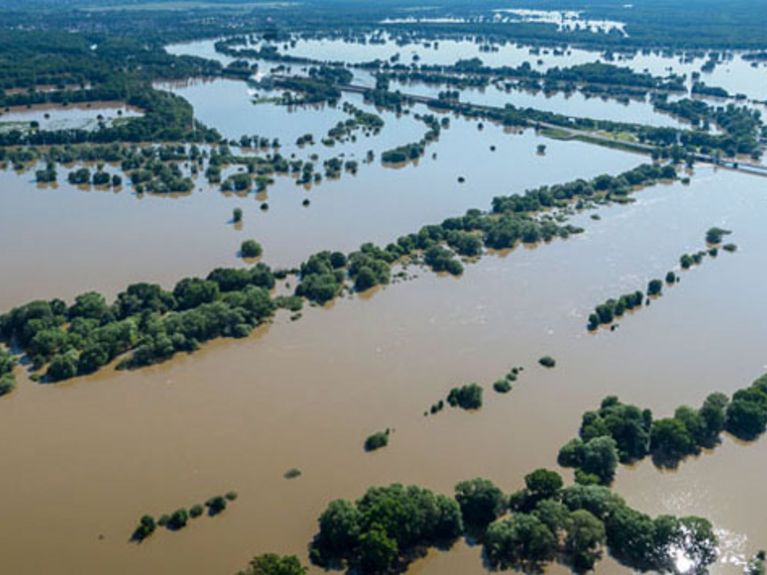Hitze, Überflutungen, Stürme
Welche Folgen hat der Klimawandel für Deutschland?

Mehr Hochwasser in Deutschland - eine Folge des Klimawandels? Bild: Andre Künzelmann, UFZ
Wissenschaftler aus aller Welt diskutierten in Berlin darüber, wie sich der globale Klimawandel regional auswirkt. Für Deutschland erwarten die Experten unter anderem mehr Stürme und Hochwasser
Although global warming may have generally slowed down over the past few years, the warming trend remains unbroken for some regions of the Earth. During an international climate research conference in Berlin, Helmholtz researchers warned of the one degree Celsius water temperature rise in the North Atlantic since 1997. "This causes increased melting of the Arctic sea ice – with incalculable consequences for the climate also in Europe", says Peter Lemke from the Alfred Wegener Institute for Polar and Marine Research.
Since Monday, more than 300 scientists from all around the world have been meeting at the Berlin Environmental Forum to discuss the regional consequences of global climate change in Germany, Europe and worldwide. The conference is organised by the Helmholtz Climate Initiative REKLIM (Regionale Klimaänderungen/Regional climate change), established in 2009. REKLIM aims at improved understanding of regional changes through new research results, ultimately enabling more reliable forecasts.
This much is clear five years into the project: Germany sees less rain in summer, but all the more of it in late winter. "This is fatal for nature, yet also for us people", says Hans Peter Schmid from the Karlsruhe Institute of Technology. "The flood risk in spring increases followed by the threat of dry spells in summer." 2013, for example, was a year of record extreme events in the Federal Republic of Germany: floods, storms and hail made it the most expensive insurance year ever. A newly developed hail index reveals a significant increase of such extreme precipitation since the 1970s. "The good news is that with respect to hail our forecasts predict only minor change for the worse until 2050", says Michael Kunz, also from the Karlsruhe Institute of Technology.
What is surprising is how much the public appreciation of potential climate-related threats fluctuates. For instance, an annual survey in Hamburg reveals that the worries and fears about extreme weather were particularly great in 2008, directly after the devastating storm front Tilo. Following an interim period, the fears increased in 2014 back to the 2008 level, this time in consequence of the deep low pressure system Xaver. "Evidently, long-term fears are determined also by short-term experience", says Beate Ratter from the Helmholtz Centre Geesthacht.
Since Monday, more than 300 scientists from all around the world have been meeting at the Berlin Environmental Forum to discuss the regional consequences of global climate change in Germany, Europe and worldwide. The conference is organised by the Helmholtz Climate Initiative REKLIM (Regionale Klimaänderungen/Regional climate change), established in 2009. REKLIM aims at improved understanding of regional changes through new research results, ultimately enabling more reliable forecasts.
This much is clear five years into the project: Germany sees less rain in summer, but all the more of it in late winter. "This is fatal for nature, yet also for us people", says Hans Peter Schmid from the Karlsruhe Institute of Technology. "The flood risk in spring increases followed by the threat of dry spells in summer." 2013, for example, was a year of record extreme events in the Federal Republic of Germany: floods, storms and hail made it the most expensive insurance year ever. A newly developed hail index reveals a significant increase of such extreme precipitation since the 1970s. "The good news is that with respect to hail our forecasts predict only minor change for the worse until 2050", says Michael Kunz, also from the Karlsruhe Institute of Technology.
What is surprising is how much the public appreciation of potential climate-related threats fluctuates. For instance, an annual survey in Hamburg reveals that the worries and fears about extreme weather were particularly great in 2008, directly after the devastating storm front Tilo. Following an interim period, the fears increased in 2014 back to the 2008 level, this time in consequence of the deep low pressure system Xaver. "Evidently, long-term fears are determined also by short-term experience", says Beate Ratter from the Helmholtz Centre Geesthacht.
The REKLIM researchers' most important findings
A total of nine research centres and nine universities are involved in the Helmholtz Climate Initiative REKLIM. Here are some of the core messages the climate researchers have developed in the initiative's eight topics:
- Regional interactions and feedback processes in the climate system of the Arctic have a significant influence on the climate in Central Europe.
- The melting rate of the ice in Greenland and the Antarctic has significantly increased over the past years. This will have long-term effects on the global sea level and coastal regions.
- The warming trend in the Arctic is clearly on the increase with consequences affecting ocean circulation, extent of the sea ice and greenhouse gas emissions from the changing permafrost ground.
- Both a regional and seasonal shift of precipitation patterns can be observed with manifest extremes (spring floods and summer droughts) and changes to soil composition.
- Changes in the composition of the atmosphere have an influence on atmospheric circulation, clouds and precipitation as well as on air quality and thus human health.
- Extreme weather events such as hail, floods and droughts indicate an increasing trend to some extent as well as a regional shift and a high degree of variability.
- Regional structures of risk perception have to be taken into consideration in the development of strategies for adapting to climate change. With regard to the accruing costs, it is important to find a balance between avoidance of emissions and adaptation decisions.
- The knowledge about causes and mechanisms of abrupt climate changes in the past provides valuable clues regarding future instabilities and global interdependencies in the development of the Earth's climate.
Please find further information on the REKLIM website.
Readers comments